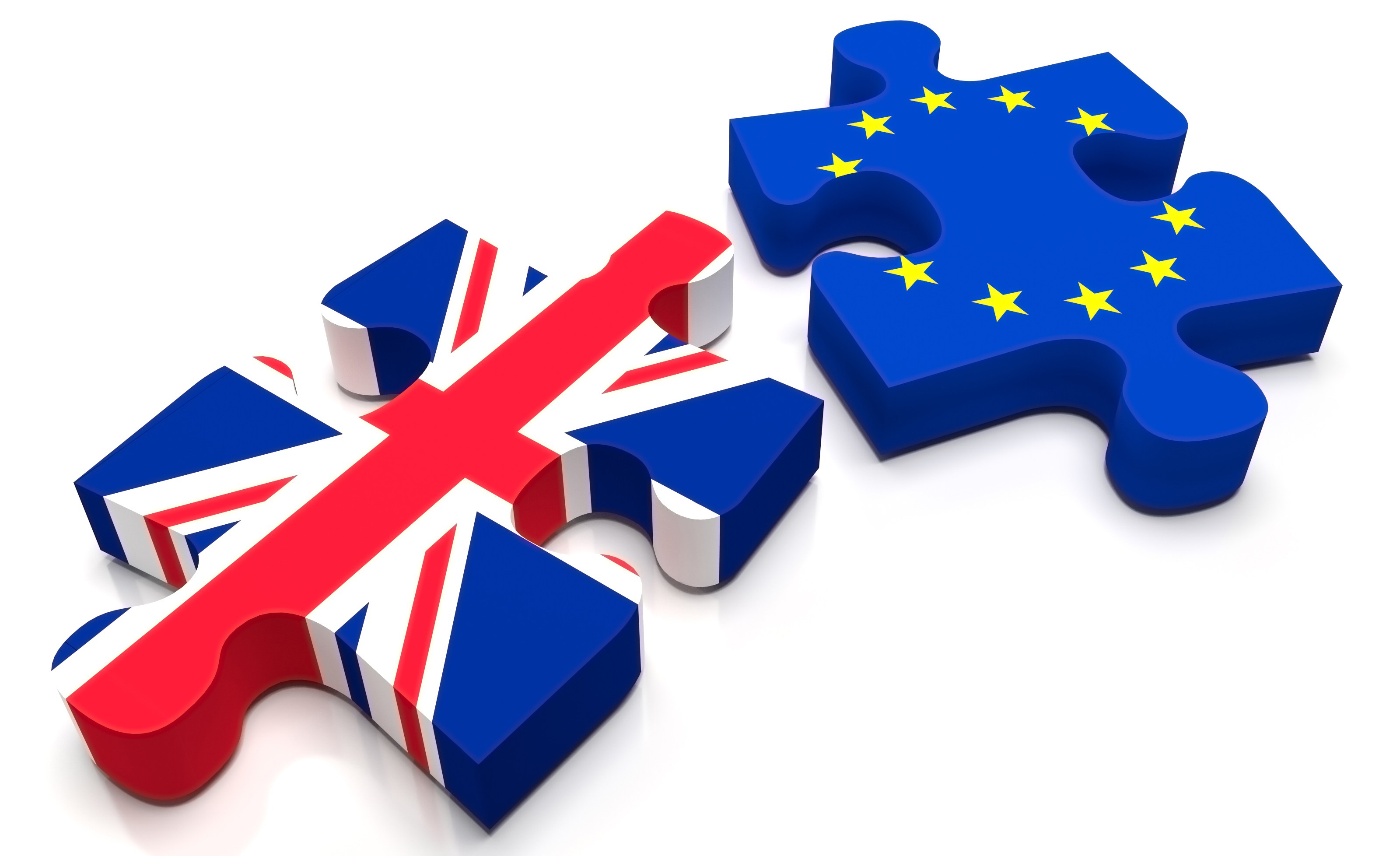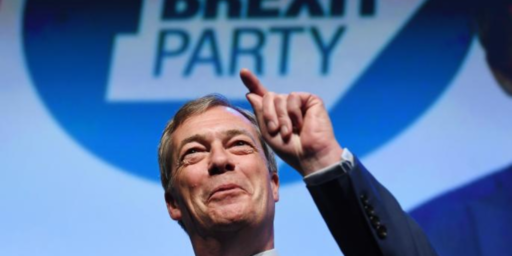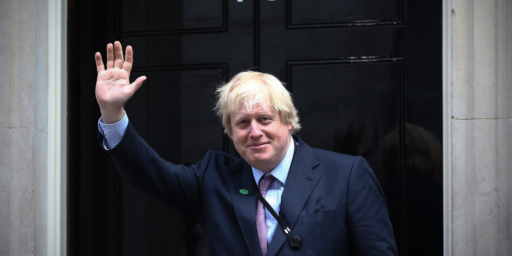Status Of Brexit Is Clear As Mud As Deadline Nears
With just over two weeks to go until the deadline, the status of Brexit is entirely unclear.

As the deadline for Brexit approaches, British Prime Minister Boris Johnson appears to be softening his position to the point where a deal just might be possible before the upcoming October 31st deadline:
A path to a Brexit deal opened Friday — but there’s still a long way to go and very little time.
EU diplomats said the U.K.’s willingness to soften its position on customs arrangements for Northern Ireland provided the breakthrough that led officials to announce they would resume intense negotiations.
The EU27 in turn restated openness to creating a “consent” mechanism that would give the government in Northern Ireland a say over how the border is managed after Brexit, a diplomat said.
The movement, which first began to show in positive mood music following a meeting Thursday between U.K. Prime Minister Boris Johnson and his Irish counterpart Leo Varadkar, led the EU’s chief negotiator Michel Barnier to announce the resumption of serious talks.
Johnson has promised to take the U.K. out of the European Union by October 31, “do or die,” and next week’s meeting of EU leaders at a European Council summit is the last chance to get a deal before that deadline.
Downing Street declined to comment but U.K. officials indicated it was not the case that Northern Ireland would stay in the EU customs union.
EU27 diplomats, who were briefed by Barnier, conceded that assessment was at least partially correct because although “any solution will involve Britain moving on the borders,” according to one diplomat, no solution had yet been agreed.
Speaking during a visit to a school Friday afternoon, Johnson ducked questions about customs arrangements in Northern Ireland.
“Well, I can certainly tell you that under no circumstances will we see anything that damages the ability of the whole of the United Kingdom to take full advantage of Brexit,” Johnson said.
However, Northern Ireland’s Democratic Unionist Party, whose support would help the British prime minister get any deal through the House of Commons, issued a statement reiterating that they would not support a deal that effectively puts a border down the Irish Sea, cutting Northern Ireland off from the rest of the U.K.
Three other diplomats said the most significant development was a U.K. agreement to go back to a draft Withdrawal Agreement from February 2018 and use that as the basis for the new round of negotiations.
Under that proposal, Northern Ireland would effectively stay in the EU’s single market and customs union after Brexit as part of a “backstop” provision for the Irish border, a mechanism designed to ensure that there is never a hard border on the island of Ireland whatever happens in future trade talks.
But that plan will only be the starting point for discussions, diplomats said: “It doesn’t mean at all that we’re close to any kind of a deal,” one of the diplomats said.
“This is what I mean when I say that they have moved, that they have accepted to start from this point,” the second diplomat said.
(…)
The biggest obstacle to a Brexit deal is the EU insistence that Northern Ireland remain in the EU customs zone and London’s insistence that the entire U.K. form its own, new customs regime. Trade experts say a compromise would require a highly creative alternative. “The question is, is there a third way?” one of the diplomats asked.
EU diplomats remain very cautious although they say that at any time next week, or even on Sunday, there could be an extraordinary meeting of EU27 ambassadors to discuss the outcome of talks. According to one diplomat the Sunday’s extraordinary meeting is already in the agenda.
Secretary General of the Council of the EU Jeppe Tranholm-Mikkelsen noted in the meeting of ambassadors that any agreement would need to be finalized by Tuesday’s General Affairs Council meeting of EU ministers because member states did not want to enter into negotiations at next week’s summit.
If no new version of the deal is agreed in time, then the progress in recent days could give the EU reason to extend negotiations but only if talks sound very promising, one of the diplomats said. Although another diplomat stressed that London is insisting it will leave on October 31st.
Meanwhile, citing a source from the Prime Minister’s office, Reuters reports say that a deal remains a long way off even as the calendar counts down:
Britain remains a long way from agreeing a final Brexit deal and the next few days will be critical if it is to agree departure terms with the European Union, a Downing Street source said on Saturday.
Negotiators for Britain and the EU have entered intense talks over the weekend to see if they can break the Brexit impasse before a crucial summit next week and a deadline for Britain to leave the bloc on Oct. 31.
News of progress in the talks sent financial markets surging on Friday after Johnson and his Irish counterpart Leo Varadkar identified a pathway to a deal following months of acrimony.
But on Saturday the deputy leader of the Northern Irish party which holds a key role in the talks signaled his concern about the mooted proposal and the Downing Street source said Britain remained ready to leave without a deal if needed.
“We’ve always wanted a deal,” the person said, on condition of anonymity. “It is good to see progress, but we will wait to see if this is a genuine breakthrough.
“We are a long way from a final deal and the weekend and next week remain critical to leaving with a deal on Oct. 31. We remain prepared to leave without a deal on Oct. 31.”
The Sunday Times newspaper reported that Johnson, the face of Britain’s 2016 campaign to leave the EU, was now “desperate” to secure a deal after security chiefs warned that leaving in a disorderly manner could inflame tensions in Northern Ireland.
Left unstated in all of this is the state of British law on the Brexit issue in the wake of recent legislation passed by Parliament over the objection of Downing Street. Prior to the suspension of Parliament, which was ultimately declared illegal by the U.K. Supreme Court, the opposition and a group of rebel Tories passed a law purporting to direct Prime Minister Boris Johnson to seek an extension of the current October 31st Brexit deadline if he is unable to reach a deal before then. In that regard, it’s worth noting that E.U. officials are on records stating that they would be willing to grant an extension, most likely to January 31st, if the Prime Minister were to request one. So far, though, Johnson has taken no steps in that direction, although he may be waiting until the summit coming up next week, which is deemed to be the last chance to reach a new deal with the E.U. before he does so. The other possibility, of course, is that Johnson will simply ignore the law, which sets as its only real penalty his inability to call a snap election immediately after the election. Of course, even if Johnson does get a new deal from Brussels he will still have to submit the matter to a Parliament that has been exceedingly skeptical of anything Brexit-related that comes from Johnson.
It’s unclear how all this will turn out, and the next two weeks will be crucial for both the United Kingdom and the European Union. As things stand now, though, the most likely outcome would seem to be that the October 31st will remain in place and that the United Kingdom will crash right through it regardless of the fact that every credible economist has argued that such a hard Brexit would be a disaster that could very well throw the United Kingdom into recession. At the very least, it would make life in the short term far more difficult for British citizens than they have become used to under the European Union, especially when it comes to the availability and price of everyday consumer goods, including food and wine. It would also have a significantly disruptive impact on trade between the United Kingdom and the Continent and, of course, would complicate the situation in Ireland where the border with Northern Ireland would have to be hardened for the first time in more than 20 years.
There’s literally no sane reason that any of this has to happen. And yet, much as is the case with the Trump Presidency here in the United States, here we are.





I suppose after Boris does his “seriously this is nothing like May’s deal” deal, his party will cheerfully reject it, extension or not.
Afterwards, the only options would be a no-deal Brexit, or something as yet un-imagined comes along and does a perfect Deus Ex Machina and saves everything (is King Arthur busy?). Because the rational option of doing a second referendum, with the terms better defined, or even a referendum on deal vs no-deal, is completely unacceptable for some reason.
One person, one vote, one bloody time and no more!
BREXIT IS–
oh the heck with it. Here’s a video of a lynx (Max) purring at a zoo in Canada. Yes who’s my Big Fluffy Bitsy Boo who needs his ears scratched….
@Kathy: There seem to be hints that Boris is prepared to throw Northern Ireland off the train, leaving them in the EU customs union and single market. Supposedly that’s the original deal that the EU offered to May back when, but she needed the DUP votes and they were opposed. I assume that the SNP will throw a fit and demand that Scotland be allowed to stay in the single market as well.
@Michael Cain: Actually the SNP is throwing a fit and demanding another vote for independence.
I really really hope that the end result of all this will be reunification of Ireland and Scotland out of the U.K.. Stupid votes should result in painful aftereffects. (Yes, and that goes for the U.S. and our idiot population as well.)
@grumpy realist:
Yes, the United Celtic Republic.
Now that the Irish have placed the Romans in their place, religion is less a factor for a joining.
@Michael Cain:
Yes, looks like that’s what’s happening.
Johnson’s initial “offer” was a non-starter, giving the DUP the effective ability to terminate the Northern Ireland regulatory alignment arrangements at any point, requiring an in-Ireland customs border, and obliging the EU and Ireland to commit to no unilateral border arrangements under any circumstances.
In effect, Northern Ireland becomes a Trojan Horse into the EU SM for a deregulated UK, and realises the Brexiteer dream of unilateral Single Market membership without free movement of labour.
It looks like the EU called that, and Johnson, faced with imminent No Deal, is having second thoughts about the inherent genius of Dom Cummings’ political strategies.
So, just a short pivot produces a more realistic plan, essentially May Deal + lipstick: some form of “balancing” the N. Ireland parties roles that effectively removes DUP unilateral power, plus an all-Ireland customs arrangement and, probably, a form of words that bounds the no-border obligations.
In effect: DUP, say hello to the chassis of the omnibus.
The question is, if that’s the deal, are there the votes?
There are signs, primarily in their unaccustomed quietness, that the ERG are getting nervous that (Cummings sourced) boasts that No. 10 would and could evade the law on a further extension were ill founded, and also that Michael Gove is warning the less mad ERG-ists that No Deal would be a hard row to hoe.
Meanwhile, remaining centrist Conservatives have been warning Johnson that No Deal as official party policy objective, rather than failure default, would see them walk.
If an attempted No Deal strategy looks tricky to achieve or sell electorally, that makes the Conservatives solid behind Johnson. Ex-Conservative rebels are also quite likely to back it.
DUP might be coerced into compliance by realising their power is now waning, the threat of No Deal to the N.I. economy, and the threat of a Corbyn govt…
And there might just be enough Labour pro-Deal votes to get it over the line.
Question is, when the Remainers attempt to attach a referendum amendment to the deal, how do the votes break then? What are the various groups tactics?
Heaven knows.
The alternative of an anti-No Deal emergency government that I had earlier hoped could looks increasingly impossible.
The Corbynites refuse anyone but “Magic Grandpa” as interim PM; LibDems, ex-Conservatives and ex-Labour will not accept that.
So, votes for Deal may be there, if no one likes the look of any of the alternatives.
Of course, this all assumes that the putative, tentative, maybe, sort of deal does not fall apart come Monday.
In the meantime, my wine consumption is up.
Of course, the real fun will come if a Deal is done, the withdrawal date passes…
and then we begin negotiations on the post-exit trading and regulatory arrangements.
I can hardly wait for screams of horror as the Leavers to realise that exit day is just the beginning of years of argument, as the reality-based population continue to campaign for EEA-type SM/CA alignment.